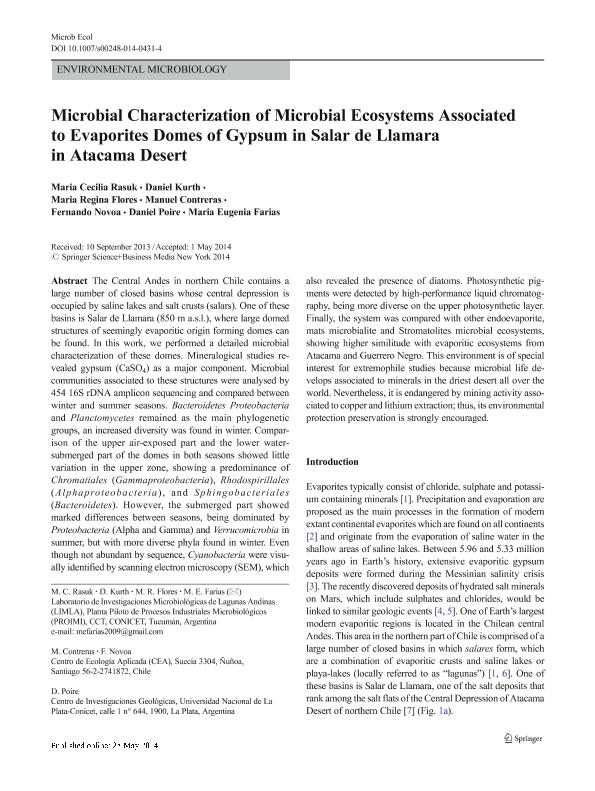Mostrar el registro sencillo del ítem
dc.contributor.author
Rasuk, Maria Cecilia

dc.contributor.author
Kurth, Daniel German

dc.contributor.author
Flores, María Regina

dc.contributor.author
Contreras, Manuel
dc.contributor.author
Novoa, Fernando
dc.contributor.author
Poire, Daniel Gustavo

dc.contributor.author
Farias, Maria Eugenia

dc.date.available
2017-11-13T18:18:11Z
dc.date.issued
2014-05
dc.identifier.citation
Rasuk, Maria Cecilia; Kurth, Daniel German; Flores, María Regina; Contreras, Manuel; Novoa, Fernando; et al.; Microbial Characterization of Microbial Ecosystems Associated to Evaporites Domes of Gypsum in Salar de Llamara in Atacama Desert; Springer; Microbial Ecology; 68; 3; 5-2014; 483-494
dc.identifier.issn
0095-3628
dc.identifier.uri
http://hdl.handle.net/11336/28046
dc.description.abstract
The Central Andes in northern Chile contains a large number of closed basins whose central depression is occupied by saline lakes and salt crusts (salars). One of these basins is Salar de Llamara (850 m a.s.l.), where large domed structures of seemingly evaporitic origin forming domes can be found. In this work, we performed a detailed microbial characterization of these domes. Mineralogical studies revealed gypsum (CaSO4) as a major component. Microbial communities associated to these structures were analysed by 454 16S rDNA amplicon sequencing and compared between winter and summer seasons. Bacteroidetes Proteobacteria and Planctomycetes remained as the main phylogenetic groups, an increased diversity was found in winter. Comparison of the upper air-exposed part and the lower water-submerged part of the domes in both seasons showed little variation in the upper zone, showing a predominance of Chromatiales (Gammaproteobacteria), Rhodospirillales (Alphaproteobacteria), and Sphingobacteriales (Bacteroidetes). However, the submerged part showed marked differences between seasons, being dominated by Proteobacteria (Alpha and Gamma) and Verrucomicrobia in summer, but with more diverse phyla found in winter. Even though not abundant by sequence, Cyanobacteria were visually identified by scanning electron microscopy (SEM), which also revealed the presence of diatoms. Photosynthetic pigments were detected by high-performance liquid chromatography, being more diverse on the upper photosynthetic layer. Finally, the system was compared with other endoevaporite, mats microbialite and Stromatolites microbial ecosystems, showing higher similitude with evaporitic ecosystems from Atacama and Guerrero Negro. This environment is of special interest for extremophile studies because microbial life develops associated to minerals in the driest desert all over the world. Nevertheless, it is endangered by mining activity associated to copper and lithium extraction; thus, its environmental protection preservation is strongly encouraged.
dc.format
application/pdf
dc.language.iso
eng
dc.publisher
Springer

dc.rights
info:eu-repo/semantics/openAccess
dc.rights.uri
https://creativecommons.org/licenses/by-nc-sa/2.5/ar/
dc.subject
Llamara
dc.subject
Microbial Ecosystems
dc.subject
Evaporites
dc.subject
Gypsum
dc.subject.classification
Meteorología y Ciencias Atmosféricas

dc.subject.classification
Ciencias de la Tierra y relacionadas con el Medio Ambiente

dc.subject.classification
CIENCIAS NATURALES Y EXACTAS

dc.title
Microbial Characterization of Microbial Ecosystems Associated to Evaporites Domes of Gypsum in Salar de Llamara in Atacama Desert
dc.type
info:eu-repo/semantics/article
dc.type
info:ar-repo/semantics/artículo
dc.type
info:eu-repo/semantics/publishedVersion
dc.date.updated
2017-10-31T17:51:51Z
dc.journal.volume
68
dc.journal.number
3
dc.journal.pagination
483-494
dc.journal.pais
Alemania

dc.journal.ciudad
Berlin
dc.description.fil
Fil: Rasuk, Maria Cecilia. Consejo Nacional de Investigaciones Científicas y Técnicas. Centro Científico Tecnológico Conicet - Tucuman. Planta Piloto de Procesos Industriales Microbiologicos; Argentina
dc.description.fil
Fil: Kurth, Daniel German. Consejo Nacional de Investigaciones Científicas y Técnicas. Centro Científico Tecnológico Conicet - Tucuman. Planta Piloto de Procesos Industriales Microbiologicos; Argentina
dc.description.fil
Fil: Flores, María Regina. Consejo Nacional de Investigaciones Científicas y Técnicas. Centro Científico Tecnológico Conicet - Tucuman. Planta Piloto de Procesos Industriales Microbiologicos; Argentina
dc.description.fil
Fil: Contreras, Manuel. Centro de Ecología Aplicada; Chile
dc.description.fil
Fil: Novoa, Fernando. Centro de Ecología Aplicada; Chile
dc.description.fil
Fil: Poire, Daniel Gustavo. Consejo Nacional de Investigaciones Científicas y Técnicas. Centro Científico Tecnológico Conicet - La Plata. Centro de Investigaciones Geológicas. Universidad Nacional de La Plata. Facultad de Ciencias Naturales y Museo. Centro de Investigaciones Geológicas; Argentina
dc.description.fil
Fil: Farias, Maria Eugenia. Consejo Nacional de Investigaciones Científicas y Técnicas. Centro Científico Tecnológico Conicet - Tucuman. Planta Piloto de Procesos Industriales Microbiologicos; Argentina
dc.journal.title
Microbial Ecology

dc.relation.alternativeid
info:eu-repo/semantics/altIdentifier/doi/https://dx.doi.org/10.1007/s00248-014-0431-4
dc.relation.alternativeid
info:eu-repo/semantics/altIdentifier/url/https://link.springer.com/article/10.1007/s00248-014-0431-4
Archivos asociados
